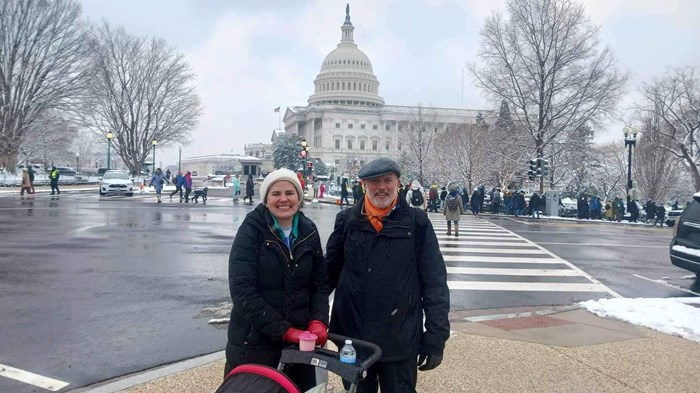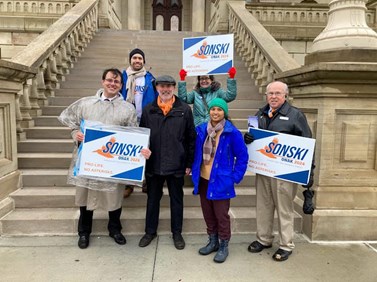
Charlie Richert would really like to stop voting for his dad.
But in the last couple presidential election cycles, the 30-year-old attorney in Indianapolis has been unable to square his conscience with picking either the Republican or Democratic party nominee, so he’s resorted to writing in a name.
“There’s no way I can escape having my faith inform how I vote,” said Richert, a nondenominational Christian who grew up Republican. “Unfortunately, we’ve been kind of stuck in a doom loop of candidates at the presidential level that I’ve just not felt comfortable voting for.”
This year, he’s not drawn to alternatives like Robert F. Kennedy Jr. or Cornel West. “Maybe I’ll write in Abe Lincoln this year. Sorry to my dad, but a new name to write in would be fun,” he said.
He recalls seeking to convince his classmates in an eighth-grade mock election that they should support Mitt Romney, but his chagrin with the Republican Party’s presidential nominee tracked with the ascension of Donald Trump.
In a year when both major party presidential candidates are viewed unfavorably by a quarter of Americans, many find themselves less excited about the two options at the top of the ticket. But, like Richert, that doesn’t mean they’re ready to go for third-party options.
The third-party candidates running in 2024 span the ideological spectrum, from independents Kennedy and Princeton University professor Cornel West to Green Party candidate Jill Stein. Then there are the more obscure party or candidate options—the Prohibition Party, Andrew Yang’s Forward Party, Maryland politician Jason Palmer, and that man in Texas who changed his name to “Literally Anybody Else.”
Perhaps the most promising third-party attempt, the No Labels Party, drew in funding with its centrist messaging, but its efforts failed before Election Day. The party ended its presidential campaign last week after being unable to find “candidates with a credible path to winning.”
RFK Jr. has emerged as the top third-party candidate this race, polling just under 12 percent, higher than any third-party candidate since businessman Ross Perot in 1992. The son of former attorney general and senator Robert F. Kennedy, his popularity is aided by his high-profile last name.
After failing to make headway in the Democratic primary, Kennedy opted to run as an independent. He is only on the ballot in half a dozen states, but his campaign is on a signature-collection blitz and has vowed to get on the ballots of all 50 states this fall.
Kennedy has said his campaign is “a spoiler for President Biden and President Trump.”
It remains to be seen which major party candidate would be hurt more if Kennedy’s strong polling translates into votes come November. But both parties are taking the threat seriously, with the Democratic National Committee and the Republican National Committee (and Trump himself, for that matter) going after the independent candidate.
“I suspect at least some of the support for RFK Jr. is really just a potholder for the anger and dissatisfaction with Donald Trump and Joe Biden,” said Mark Caleb Smith, a political scientist at Cedarville University in Ohio.
Kennedy is Catholic and at times has appealed to his faith in interviews and on social media. His policies span the ideological and political spectrum, and he’s best known for his environmental activism.
He’s also antiestablishment and was a vocal critic of the COVID-19 pandemic lockdowns and vaccine mandates, and he has criticized the impact that had on the right to religious assembly. He’s pro-choice and believes that the Dobbs v. Jackson decision overturning a national right to abortion was a mistake.
For evangelicals seeking candidates who reflect their values and beliefs more closely than either of the major parties, some have backed indepedent candidates or found new political homes in lesser-known third parties.
Dale Huntington, a 41-year-old pastor of City Life Church in San Diego, California, landed on the American Solidarity Party (ASP), a small but growing Christian party founded in 2011. Its platform is largely shaped by social teaching from Catholic thought.
He found out about the group because of evangelical author and professor Karen Swallow Prior, who is a member of ASP’s advisory board.
“I don’t support the death penalty or abortion. I am largely anti-war and anti-police brutality,” Huntington said. “I would say voting for a third party is choosing to acknowledge the system as it is has become broken.”
Huntington used to alternate between Republican and Democrat tickets but ultimately felt like neither was holistically pro-life.
In 2020, the American Solidarity Party ran its first evangelical presidential nominee—retired teacher and former Evangelical Free Church elder Brian Carroll (whom CT reported on at the time).
Carroll had long had his doubts about the Republican Party’s level of commitment to pro-life policies. But it was the GOP’s hardening on immigration, education, and other issues in 2016 that made him defect entirely.
After that, he went looking for other options. When he stumbled upon the ASP, he said, “[I] read the platform once and I said, ‘Yes, this is it.’”
When Carroll ran, the COVID-19 pandemic and lockdowns made campaigning difficult. It also was a challenge for volunteers to garner signatures during lockdowns. Despite that, they had some success. Last presidential election, the American Solidarity Party made it onto the ballots of 8 states—and received write-in votes in 31 states. They drew over 42,000 votes in total.
“We’d love to double the number,” Marcos Lopez, party chair, told CT.
Ballot access is a huge challenge, he added, for a party facing limited financial resources, a small pool of volunteers, and stringent state requirements to get on the ballot.
Despite challenges, interest in the group is growing. There was a surge in volunteer signups online after Super Tuesday last month, when it became clear that November would bring a Donald Trump and Joe Biden rematch.
Party members acknowledge that winning is not in the cards, but they believe a third option allows Americans who reject the “lesser of two evils” argument to vote in a way that respects their conscience and sends a message.
“Whether you’re Catholic, whether you’re Baptist, whether you’re a nondenominational evangelical, whether you’re Orthodox—anyone who is serious about their faith, and anyone who’s serious about wanting to see these policies grounded in advancing the common good—anyone who wants to see those things happen is willing to come to the table,” Lopez said.
The issue of abortion has been a particular draw for religious individuals, Lopez said. “We’re looking at an issue in November where neither [Republican nor Democrat] candidate really fits the label of pro-life. … In many states we’re going to be the only pro-life option people can vote for, and that’s a very sad reality. But it is a reality, and that makes our work even more important.”
Abortion can be a deal breaker for some evangelicals when it comes to crossing the aisle to support Biden. While the Trump campaign has highlighted pro-life wins (such as the Dobbs decision), Trump has presented a softer approach to the issue in recent days.
On Monday, he said it should be left to the states to carve out individual abortion policies. “At the end of the day, this is all about the will of the people. You must follow your heart, or in many cases, your religion or your faith,” he said in a video statement.
On Thursday, he said in response to a reporter that he would not sign a federal abortion ban.
This year, Peter Sonski, a former editor for the National Catholic Register, is the American Solidarity Party candidate. Sonski, 61, has been a member of both the Democratic and Republican parties throughout his life but was frustrated that neither fully matched his religious convictions.
“We want to protect human life, give it all the protections of the law,” Sonski said of his party. “At the same time, we recognize there are many more things that the government can do—and society in general can do—for women who have needs in pregnancy … health care, expanded child tax credits, better housing options; all of these are factors.”
The father of nine and grandfather of six brings the experience of an elected official to the role: He serves as a school district member for the board of education for Connecticut’s 17th District. He tapped Lauren Onak, a 35-year-old stay-at-home mother and community organizer, as his vice president candidate.

Onak was raised a Democrat but defected to the Republican Party due to her interest in the pro-life movement. But a number of things caused her to break with the party, culminating in the birth of a daughter with a rare genetic syndrome and seeing how the social safety net of a “blue state” like Massachusetts benefited her daughter’s special needs.
It was “seeing the importance for this social safety net very much in action and having to push back against this mindset of, if you need help from the government, it makes you somehow weak,” she said.
She joined the American Solidarity Party in 2021, following the chaos of the COVID-19 pandemic and social unrest, believing it offered a “reasonable voice in politics.” At 35, she’s just old enough to join the presidential ticket. She believes her candidacy is important for other disillusioned millennials.
One of those millennials is Bob Stevenson, a 40-year-old pastor in Chicago who found himself frustrated with having to choose which convictions to prioritize when he went to the ballot box.
He felt like he had to pick between unborn babies or immigrants and people in poverty.
“It’s almost like, that’s a red thing or that’s a blue thing. And I’m like, that’s a Christian thing,” Stevenson told CT. Although he said no party is perfect, he found the American Solidarity Party “straddles those concerns in a way that partisan politics don’t. So that was deeply attractive to me.”
Third parties have a tough uphill battle, largely due to the two-party structure that dominates American politics.
“We do have an abundance of third parties,” Smith said. “They just can’t seem to rise to the point where they have a significant impact. Most of that is because the two major parties absorb them.”
But third parties still have an effect: Smith gave the example of the Green Party elevating climate and environmental issues, which resulted in Democrats incorporating more of those concerns into their platform; or Republicans (at least in days past) leaning more libertarian and drawing voters away from the Libertarian Party. Other examples include the abolition of slavery and universal health care.
Smith says that rather than third parties or candidates becoming competitive, major changes in American politics usually happen within the vehicle of a major party. Or, at times, a major party falls by the wayside only to be replaced, such as the Whigs, who were replaced by Republicans.
“It isn’t that a third party rises up and it’s competitive. It’s one of the two major parties just implodes, and then this party steps forward and kind of picks up the pieces and you see something else emerge,” Smith said.
While the framework of Republican and Democratic parties has been in place since 1856, Smith said dissatisfaction with the options is at a “pretty significant and historical” level: “We keep seeing that in primary results on both sides of the aisle—even though the contest has been settled for a long time—that both candidates are getting pretty significant pushback.”
Former South Carolina governor Nikki Haley continues to garner primary votes, despite dropping out after Super Tuesday’s primaries confirmed she had no viable path to the Republican nomination for president. On the Democratic side, progressives organized to lodge protest votes to send a message to Biden in Michigan’s Democratic primary, racking up more than 100,000 “uncommitted” votes.
But that may not translate to large numbers of Americans choosing to send a statement by voting outside the major parties on November 5.
Americans unhappy with their options may be more likely to tune politics out and sit elections out entirely. Those who head to the ballot box despite frustration and alienation from both major parties, Smith noted, “are a fairly small group of people.”
Christians who vote third party are aware that they’re a minority. But they think there are some things more important than making a pragmatic choice. Stevenson said when friends or family found out he planned to vote third party, they looked at him like he had his “head screwed on backwards.”
But he believes that “it’s a way for us to bear witness in the United States where Christians have historically, over the past couple of decades, aligned themselves with a political party and have shown themselves to be political opportunists and pragmatics.”
“I think it’s an opportunity for us to offer a different way. We can be like, actually the way of Jesus doesn’t look like an elephant or a donkey.”
Correction: Brian Carroll had served as an elder in the Evangelical Free Church, not the Evangelical Covenant Church.

Support Our Work
Subscribe to CT for less than $4.25/month


















